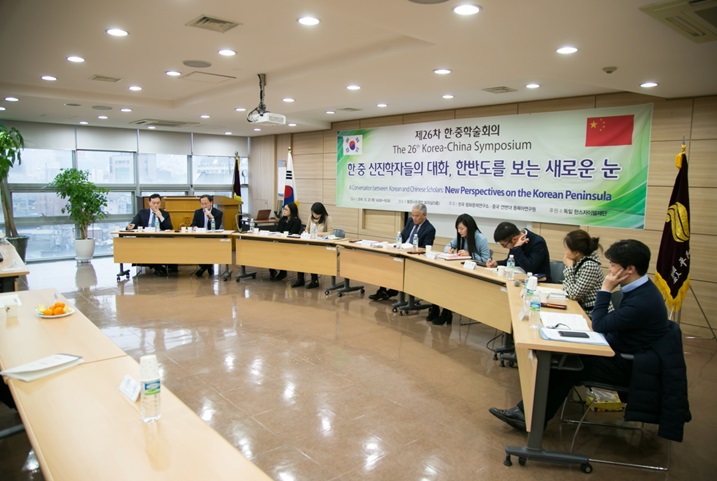26th China Seminar
Four Presenters were invited to talk about different topics
The reason for the change of location is the most recent disruption of the South-North Korean relations after the 4th and 5th nuclear tests that North Korea conducted this year. With the North Korean regime resuming its nuclear-programme, crimes (abduction, terror, murder) against South Koreans in the Chinese border region (especially close to Yenji), have increased. Thus, the IPA decided to move the 26th China Seminar to Seoul. It took place in the afternoon of December 22nd with the title “Conversations of young scientists from China and South Korea – A new vision for the Korean peninsula.” The following four scientists presented various topics:
1. Ms Prof. Dr. Hau, Jin-hwan (Assistant-Professor at the Academy of Social Sciences, Shanghai): “Analyzing the effects and limits of the UN-Security Council’s Sanctions imposed on North Korea”;
2. Ms Cho, Ui-hok (PhD candidate of Political Science at Korea University): “South Korean-American Alliance and North Korean Provocations”;
3. Ms Woo, Ak-young (PhD candidate of North Korean Studies at Dongguk University): “Comparison of China’s Sonburon (Economic Inducement) with North Korea’s Strategy of Economic Revolution”;
4. Mr Cho, Woo-hyung (PhD candidate of North-Korean Studies at Dongguk University): “Peace-building processes in Northern Ireland and its lesson for peace-building processes on the Korean peninsula.”
Following are the summaries of the four presentations:
1. Ms Prof. Dr. Hau, Jin-hwan: “Analyzing the effects and limits of the UN-Security Council’s sanctions imposed on North Korea.”
In March 2016, after North Korea’s 4th nuclear test, the UN-security council decided upon the resolution 2270, with which it imposed sanctions on North Korea. Thus far, although the sanctions indeed seem to affect North Korea, they are not very effective. It is highly unlikely that the sanctions will force North Korea to give up its nuclear programme. Moreover, there is no consensus between China and the US on specific measures against North Korea. As long as there is no agreement on these differences in opinion, international sanctions will not have the desired effect.
2. Ms Cho, Ui-hok: “South Korean-American Alliance and North Korean Provocations.”
There is empirical evidence that North Korean provocations increase, when the alliance between South Korea and America becomes stronger. In that case North Korean provocations aim to weaken the ties between the two allies. In order to maintain stability on the peninsula, South Korea and America must maintain a constantly stable relationship.
3. Ms Woo Woo, Ak-young: “Comparison of China’s Sonburon (Economic Inducement) with North Korea’s Strategy of Economic Revolution.”
Both the North Korean and the Chinese state have been established after the Second World War (1948 and 1949). However, the development of both countries over the past 60 years differs greatly. While China grew to become the world’s second largest economy, North Korea faced enormous economical difficulties. What brought about this great economical gap? China did follow a strategy of economical inducement, focusing on establishing a political and social system, but put strong emphasize on economic growth. North Korea on the other hand was less successful with its revolutionary economic strategy. It failed mainly because of its “Military First” principle.
4. Mr Cho, Woo-Hyun: “Peace-building process in Northern Ireland and its lesson for peace-building processes on the Korean peninsula.”
The conflicts and peace-building processes in Northern Ireland and on the Korean peninsula seemingly don’t have much in common. However, there is one visible similarity: In both countries traces of their past are still evident in peoples’ everyday lives. Similar to Korea, there is a territorial border and a separation of space of living in Ireland. Also similar to Korea, tensions in Ireland are still obvious despite the agreement made in 1998 (Belfast Agreement). In order to make peace on the peninsula, the Korean people have to overcome its negative experiences of the past.

